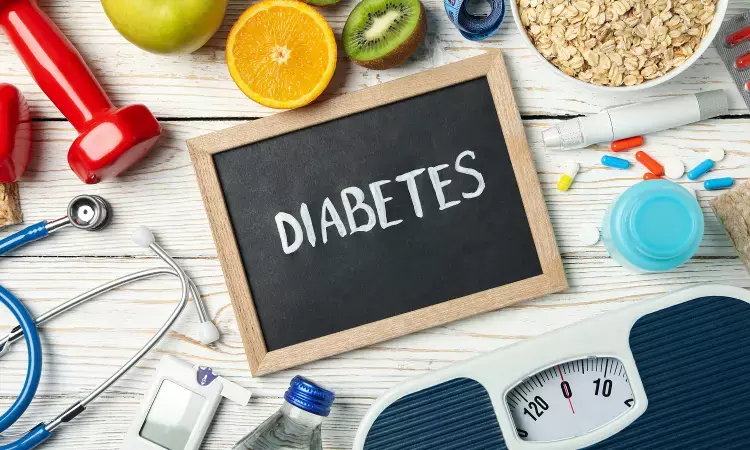- Home
- Medical news & Guidelines
- Anesthesiology
- Cardiology and CTVS
- Critical Care
- Dentistry
- Dermatology
- Diabetes and Endocrinology
- ENT
- Gastroenterology
- Medicine
- Nephrology
- Neurology
- Obstretics-Gynaecology
- Oncology
- Ophthalmology
- Orthopaedics
- Pediatrics-Neonatology
- Psychiatry
- Pulmonology
- Radiology
- Surgery
- Urology
- Laboratory Medicine
- Diet
- Nursing
- Paramedical
- Physiotherapy
- Health news
- Fact Check
- Bone Health Fact Check
- Brain Health Fact Check
- Cancer Related Fact Check
- Child Care Fact Check
- Dental and oral health fact check
- Diabetes and metabolic health fact check
- Diet and Nutrition Fact Check
- Eye and ENT Care Fact Check
- Fitness fact check
- Gut health fact check
- Heart health fact check
- Kidney health fact check
- Medical education fact check
- Men's health fact check
- Respiratory fact check
- Skin and hair care fact check
- Vaccine and Immunization fact check
- Women's health fact check
- AYUSH
- State News
- Andaman and Nicobar Islands
- Andhra Pradesh
- Arunachal Pradesh
- Assam
- Bihar
- Chandigarh
- Chattisgarh
- Dadra and Nagar Haveli
- Daman and Diu
- Delhi
- Goa
- Gujarat
- Haryana
- Himachal Pradesh
- Jammu & Kashmir
- Jharkhand
- Karnataka
- Kerala
- Ladakh
- Lakshadweep
- Madhya Pradesh
- Maharashtra
- Manipur
- Meghalaya
- Mizoram
- Nagaland
- Odisha
- Puducherry
- Punjab
- Rajasthan
- Sikkim
- Tamil Nadu
- Telangana
- Tripura
- Uttar Pradesh
- Uttrakhand
- West Bengal
- Medical Education
- Industry
Lowering Carbohydrates and Increasing Protein intake helps in Diabetes Remission: ICMR Study

Lowering carbohydrates and increase protein intake can result in diabetes remission and prevention, a recent national study by the Indian Council of Medical Research–India Diabetes (ICMR-INDIAB) has reported.
The ICMR-INDIAB study is a population-based study and included 18,090 adults across different states in India and is the country's largest epidemiological study on diabetes. The study was conducted to derive macronutrient recommendations for remission and prevention of type 2 diabetes (T2D) in Asian Indians using a data-driven optimization approach.
Different assessments, including dietary, behavioral, and demographic, were performed. Along with these, fasting and 2-h post glucose challenge capillary blood glucose and glycosylated hemoglobin (HbA1c) were estimated.
The study obtained various glycemic categories, such as newly diagnosed diabetes (NDD), prediabetes (PD), and normal glucose tolerance (NGT). Macronutrient recommendations were formulated to compute optimal macronutrient compositions that would reduce the sum of the difference between the estimated HbA1c and the targets for remission and prevention of progression in T2D in PD and NGT groups.
Some of the salient findings of the study include:
• Diabetes remission can be achieved in NDD if carbohydrate content is reduced to 49-54% while increasing protein intake by 19-20% and maintaining fat consumption at 21-26%.
• Reducing carbohydrate consumption by 50-60% and increasing protein by 18-20% and fat by 21-27% is recommended for the remission of PD to NGT.
• For the prevention of Type 2 Diabetes Mellitus in PD and NGT: reduction of carbohydrate intake by 54–57% and 56–60%; increasing protein intake by 16–20% and 14–17%, respectively; and fat 20–24% for PD and NGT is sufficed.
To conclude, the study's finding reaffirms a reduction in carbohydrates (%E) and an increase in protein (%E) for both T2D remissions and prevention of progression to T2D in PD and NGT groups.
Reference:
Ranjit Mohan Anjana, Seshadhri Srinivasan, Vasudevan Sudha, et.al, ICMR-INDIAB Collaborative Study Group; Macronutrient Recommendations for Remission and Prevention of Diabetes in Asian Indians Based on a Data-Driven Optimization Model: The ICMR-INDIAB National Study. Diabetes Care 2022; dc220627. https://doi.org/10.2337/dc22-0627
Medical Content Writer at Medical Dialogues. Kimi holds an MSc in Forensic Science from the University of Delhi.
Dr Kamal Kant Kohli-MBBS, DTCD- a chest specialist with more than 30 years of practice and a flair for writing clinical articles, Dr Kamal Kant Kohli joined Medical Dialogues as a Chief Editor of Medical News. Besides writing articles, as an editor, he proofreads and verifies all the medical content published on Medical Dialogues including those coming from journals, studies,medical conferences,guidelines etc. Email: drkohli@medicaldialogues.in. Contact no. 011-43720751


